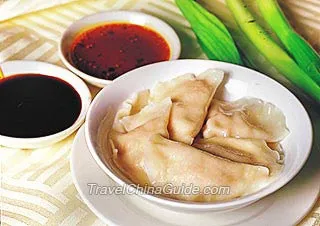16 Special Winter Solstice Rituals in Different Places of China
Winter Solstice, also called Winter Festival is not only an important solar term, but also a traditional folk festival in China. Many Winter Solstice rituals are held to celebrate it, in addition to the most well-known eating dumplings in north China and glutinous rice balls in the south. Here are 16 Winter Solstice rituals in different places of China.
1. North China: Eat Dumplings on Winter Solstice
 |
| Dumplings |
Dumplings are an ancient Chinese pasta. The northerners eat dumplings during Chinese New Year. In ancient China, Winter Solstice was as important as the New Year, so the dumplings should not be in absence. This Winter Solstice ritual is related to Zhang Zhongjing, a Chinese medical scientist who invented dumplings to treat people who suffered from ear frostbite. After being cured, people ate dumplings on Winter Solstice to commemorate him. Nowadays, there is still a saying that eating dumplings on Winter Solstice can protect ears from frostbiting.
![]() See also Winter Solstice Folklore: 8 Stories in China
See also Winter Solstice Folklore: 8 Stories in China
2. South China: Eat Glutinous Rice Balls
3. Beijing & Suzhou: Eat Wontons
4. Hangzhou: Eat Glutinous Rice Cake (Niangao)
5. Shandong: Worship Confucius and Enjoy Mutton Soup
It is said the Winter Solstice is the Teacher’s Day in ancient times. In Shandong, students worship Confucius, the great educator and thinker, to show gratitude to their teachers.
6. Ningxia: Special Mutton Soup called Tounao
7. Guangdong: Siu Mei (Roasted Meat)
8. Hong Kong: Family Reunion Dinner
9. Teochew: Worship Ancestors and Eat Sweet Balls
Eating sweet balls made of glutinous rice is almost universal in the entire Chaoshan area. After people worship the ancestors with sweet balls on this day, they put some on their roofs, beams, and rice tanks for that they believe the sweet balls can bless next year with bumper harvest and luck.
10. Xiamen, Fujian Province: Eat Jiangmu Duck
11. Hakka: Make Wine on Winter Solstice Day
Hakka people believe that the water in Winter Solstice is the tastiest and the wine made of the water is smooth and sweet, so they make wine in Winter Solstice, which has become a Winter Solstice ritual.
12. Taiwan: Worship Ancestors with Nine-layer Cakes
In Taiwan, the tradition of worshipping ancestors with nine layers rice cakes is preserved. The cake is named because it contains nine layers of glutinous rice. Besides, people made the glutinous rice doughs into chickens, ducks, turtles, pigs, cows, sheep and other animals that symbolize good luck, and then steam them for sacrifice. On the day of the Winter Solstice, people with the same ancestors gather together to worship the ancestors one by one from the old to the young . After the worship, there will be a banquet for people who come to worship the ancestors.
13. Yunnan: Eat Ciba Cakes
In Yunnan, there is a Winter Solstice ritual of eating ciba cakes which is made by pounding steamed glutinous rice. On this day, the family sit around the fire basin and bake ciba cake on the fire. If there are someone coming for visit, the best food to welcome the guests is also ciba.
14. South China: Glutinous Rice Mixed with Red Beans
In Jiangsu, Shanghai, Zhejiang and some places in the south, people eat rice mixed with red beans at the Winter Solstice night. It is said that ghosts and devils are afraid of red beans, so people cook red bean rice on the day to evade the epidemic and prevent disease. Scientifically, the glutinous rice can nourish the body and warm up the whole body which is suitable for cold winter.
15. Zhejiang: Eat Buckwheat Noodles
In Zhejiang, people eat buckwheat noodles on the Winter Solstice day. The whole family gather together, and the daughter who is married should go back to her husband’s family to eat the noodles. They believe buckwheat noodles can help to remove dirty foreign matters in stomach.
16. Ningbo, Zhejiang: Sweet Potato Soup with Glutinous Rice Balls
People in Ningbo eat sweet potato soup with glutinous rice balls in the Winter Solstice morning. Sweet potato in Chinese has the meaning of bad things are over. Glutinous rice ball indicates family reunion. They also make roast rice cake on the day to express their best wishes.![]() You May Like:
You May Like:
6 Chinese Winter Solstice Foods to Warm You Up
How do Chinese people celebrate Winter Solstice?
Dongzhi Festival - Winter Solstice Festival Celebrated in China
10 Interesting Winter Solstice Traditions around the World